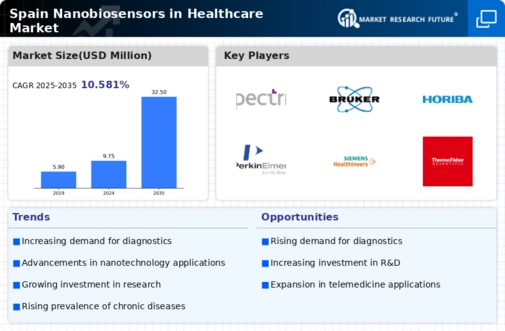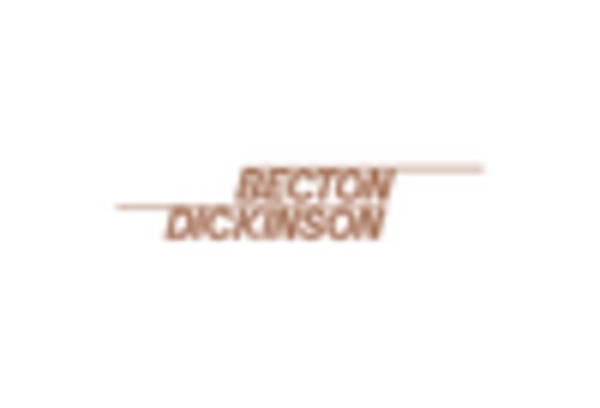Regulatory Framework Enhancements
Enhancements in the regulatory framework surrounding medical devices are playing a pivotal role in shaping the nanobiosensors in-healthcare market. In Spain, regulatory bodies are streamlining the approval processes for innovative medical technologies, which is likely to encourage the development and commercialization of nanobiosensors. The European Medicines Agency (EMA) has introduced guidelines that facilitate the assessment of nanotechnology-based products, ensuring safety and efficacy. This supportive regulatory environment is expected to reduce barriers to market entry for new nanobiosensor technologies, thereby fostering competition and innovation within the healthcare sector.
Growing Prevalence of Chronic Diseases
The rising prevalence of chronic diseases in Spain drives the demand for advanced diagnostic tools, including nanobiosensors. Conditions such as diabetes, cardiovascular diseases, and cancer are becoming increasingly common, necessitating continuous monitoring and early detection. The nanobiosensors in-healthcare market is poised to benefit from this trend, as these devices can provide real-time data on patient health, enabling timely interventions. According to recent statistics, chronic diseases account for over 70% of healthcare costs in Spain, highlighting the urgent need for effective monitoring solutions. This growing burden on the healthcare system is likely to accelerate the adoption of nanobiosensors, which can offer cost-effective and efficient diagnostic capabilities.
Advancements in Nanotechnology Research
Advancements in nanotechnology research are significantly influencing the nanobiosensors in-healthcare market. In Spain, academic institutions and research organizations are increasingly focusing on the development of nanomaterials that enhance the performance of biosensors. These advancements are leading to the creation of more sensitive and specific detection methods, which are crucial for effective disease management. Collaboration between universities and healthcare companies fosters innovation, leading to the introduction of cutting-edge nanobiosensors. As research continues to evolve, the market is expected to expand, driven by the continuous improvement of nanotechnology applications in healthcare.
Rising Demand for Point-of-Care Diagnostics
The increasing demand for rapid and accurate diagnostic tools is a key driver for the nanobiosensors in-healthcare market. In Spain, healthcare providers are seeking solutions that enable immediate patient assessment, particularly in emergency and outpatient settings. Nanobiosensors offer the potential for real-time monitoring of biomarkers, which can significantly enhance patient outcomes. The market for point-of-care testing is projected to grow at a CAGR of approximately 10% over the next five years. This indicates a robust interest in technologies that facilitate quick decision-making in clinical environments. This trend is likely to propel the adoption of nanobiosensors, as they can provide high sensitivity and specificity in detecting various diseases, thus addressing the urgent need for efficient healthcare solutions.
Increased Investment in Healthcare Innovation
Investment in healthcare innovation is a significant driver for the nanobiosensors in-healthcare market. In Spain, both public and private sectors are channeling funds into research and development of advanced medical technologies. The Spanish government has allocated approximately €1 billion for healthcare innovation initiatives, which includes funding for nanotechnology applications in medicine. This financial support is expected to foster the development of novel nanobiosensors that can improve disease detection and monitoring. As a result, the market is likely to witness a surge in innovative products that leverage nanotechnology, enhancing the overall healthcare landscape in Spain.
















